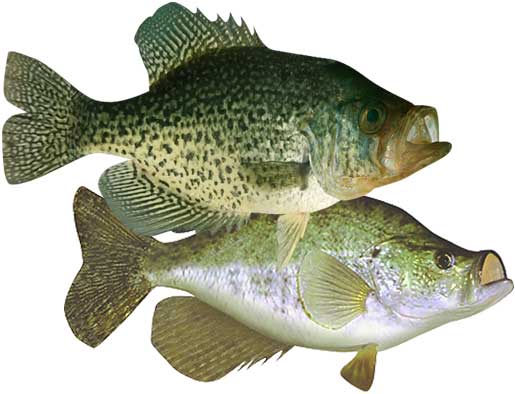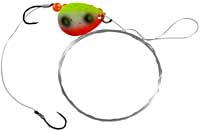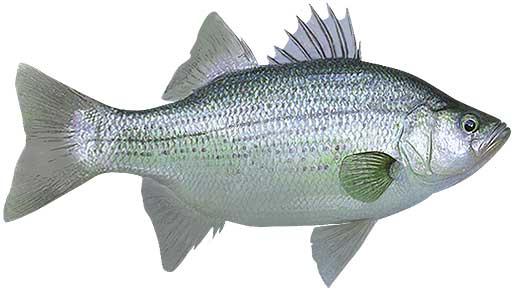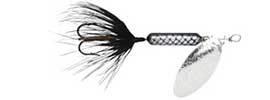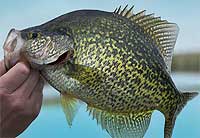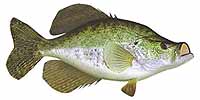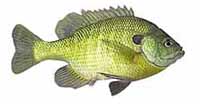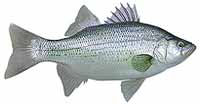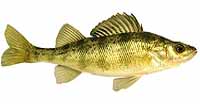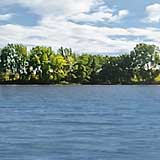Fishing Report For Davis Creek Reservoir, NE
By Rick Seaman
Last updated on .
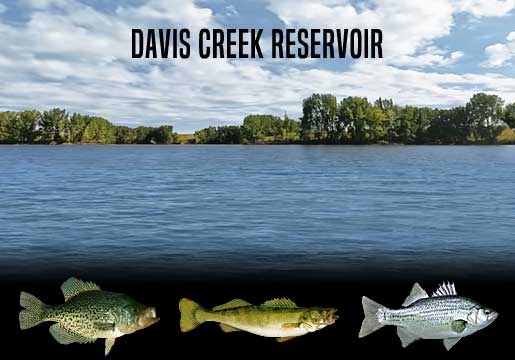
Fishing Reports
Popular Fish Species Davis Creek Reservoir, NE
Fishing Report: Black & White Crappie
Current Fishing Report: Good
Both black and white crappie are being caught using new technologies, reducing the amount of time it takes to locate schools. Forward-facing sonar is allowing anglers, fishing from a boat, to locate schools and focus fishing time on areas with good numbers of crappie. This is true for trolling or casting. Anglers fishing from the bank still have to search the old fashion way, via test casting, until a school is located. Then, they are catching them just as anglers have for many decades.
SUMMER. Water temperatures are currently in the mid to high 70's, and crappie fishing has been good. Now that the spawn is over, and the hot Summer sun is warming the shallows, crappie have retreated to depths of 8 to 15 feet, or embedded in the shade of heavy vegetation. This is a good time to focus on schools of crappie hanging around brush piles, around deep timber, above rocky structures and creek channel edges. Good reports are coming from anglers trolling with crankbaits or vertical jigging
FALL. Baitfish, which will be moving into shallow flats, coves and bays, will draw crappie into these areas, where they will feed heavily in preparation for the cold Winter. Small spoons, along with hair jigs, underspins and crappie jigs, are good options during this feeding marathon.
WINTER. Once the shallows start cooling rapidly, crappie will migrate to deeper holding areas, mostly off shore. Once the lake freezes over, At this time they are typically caught using a very slow presentation, in 10 to 39 feet of water. If they are suspending in open water, they often relate to some cover, or structure change, directly below them.
SPRING. Spring is the ideal time to be on the water, as crappie have moved shallow to spawn. In early Spring, crappie begin staging in 4 to 10 feet of water, just outside shallow spawning bays and flats. At that time, they are typically caught in 2 to 4 feet of water. Brush, wood and vegetation are where most anglers are catching good numbers using small crappie jigs or hair jigs. After the spawn, crappie move outside the spawning area and typically hold deeper on the closest cover. Once they move off the beds, anglers are reporting good success using fish finders and forward facing sonar to locate schools of crappie, which tend to stack vertically around cover. Light tackle with 4 lb to 8 lb line is a popular choice.
Fishing Report: Walleye
Current Fishing Report: Good To Very Good
A lot of walleye are being caught using new technologies, cutting down on the time it takes to locate them. Forward-facing, and side scanning, sonar is assisting anglers, fishing from a boat, to locate fish. Fishing is better as anglers can focus on areas with good numbers of walleye. This is true for either trolling or casting. Anglers fishing from the bank still have to search the old fashion way, via test casting, until a school is located.
Spring and Fall are the best seasons for catching walleye, as they spend a great deal of time shallow.
SUMMER. The current water temperature is in the mid 70's, and walleye fishing is fairly good. During Summer, early in the morning, and from dusk to long after dark, are good times to catch walleye. At those times they move shallow to feed during these low-light conditions. Night fishing has been decent, as well. The rest of the time they are 12 to 25 feet deep, cruising flats and creek channel edges, where they are feeding on gizzard shad and small fish. When the bite is slow, grubs and nightcrawlers, fished just off the bottom are catching walleye. Vertical jigging with spoons, and slow-trolling crankbaits along channel edges is also delivering good reports.
FALL. Fall brings cooler temperatures to shallow water, drawing walleye and baitfish into the shallows. Vertical jigging with spoons and bladebaits, as well as trolling with crankbaits and spinnerbaits are all historically good for catching walleye again. Watch for the bigger walleye to be slightly deeper than the majority of the school.
WINTER. This Winter fishing for walleye was pretty good through the ice. They primarily feed on gizzard shad and other small fish, staying close to the bottom. Blade baits, jigs, spoons, and jigs, are all working while ice fishing. as well as while trolling or slow drifting after ice out.
SPRING. Walleye will begin moving to major, rocky points and flats, where anglers are finding them in 3 to 12 feet of water, especially around rocky areas and inlet channels. Here they will spawn once the water warms to the mid to high 40's. Afterwards, they move to points, flats, shoals and ledges in 8 to 10 feet of water, just off shore and nearby their spawning locations. Bright colored jigs, tipped with grubs or nightcrawlers, spinnerbaits, jerkbaits and crankbaits at this time.
Fishing Report: White Bass
Current Fishing Report: Good
The use of new technology is helping anglers catch more white bass. Forward-facing, and side scanning, sonar is currently one of the the best way to locate schools of fish, especially when they hang out in deep water. Once located using these sophisticated fish finders, white bass are being caught by trolling, casting or jigging,
SUMMER. Summer finds white bass congregating in the main lake area, following and feeding on baitfish in open water, creek channels, and near submerged humps. Most good reports are coming from 10 to 25 feet deep. They are being caught on small spinnerbaits, spinners, curly-tail jigs, underspins, spoons and small crankbaits, depending on the depth of the baitfish.
FALL. Early Fall finds white bass chasing baitfish that have moved into shallow coves and bays, from 5 to 20 feet deep. Later, once the shallows cool from chilly Fall temperatures, large schools of white bass, along with baitfish, move deeper and are relating to most structure that includes drops, humps and creek channels in deeper water.
WINTER. Winter for white bass is a continuation of Fall patterns, except slightly deeper, around 15 to 30 feet. They are being caught on the same lures, but most are caught using a slower retrieve works best.
SPRING. White bass start their spawn run once the water temperature reaches the mid 50's, where they migrate to the river, inflowing creeks, tailwaters, or along windy points where they stay for several weeks. Early Spring is a prime time to fill the livewells with some fat white bass. Spinnerbaits, curly-tail jigs, underspins, small crankbaits, small jerkbaits, and most any lure that resembles baitfish, will catch these feeding whites. As the water temperatures continues warming, they move out of spawning areas, into slightly deeper water. Look for them following schools baitfish in 10 to 25 feet deep. Also, watch for feeding frenzies when they chase schools of bait to the surface, as the fishing can be spectacular.
Lake & Fishing Video
Fishing tips for boat or bank fishing
Fish species to fish for...
Guide to fishing for largemouth bass, channel catfish, black crappie, white crappie, walleye, bluegill, white bass, yellow perch and wiper at Davis Creek Reservoir in Nebraska.
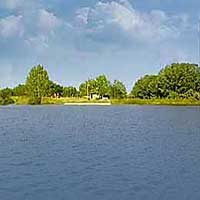
Davis Creek Reservoir is a 1,100-acre lake with 24 miles of shoreline. The lake has decent populations of crappie, walleye, white bass, largemouth bass, catfish, and sunfish. There is plenty of shoreline for bank fishing if you don't mind a bit of walking.
Primary fish species to catch
Click images for fishing tips and details about each species.
Today's Weather & Forecast
Public Boat Launch Ramps & Landings
Click here for boat ramps.
Fishing License
Click here for a Nebraska Fishing License.
Map - Fishing & Access
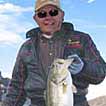 Rick Seaman is a fishing enthusiast with over five decades of fishing experience, a retired tournament fisherman, author of numerous published articles on fishing, and co-author of the book "Bass Fishing - It's not WHAT you throw, It's WHERE you throw it".
Rick Seaman is a fishing enthusiast with over five decades of fishing experience, a retired tournament fisherman, author of numerous published articles on fishing, and co-author of the book "Bass Fishing - It's not WHAT you throw, It's WHERE you throw it".
Contact Information
Lower Loup Natural Resources District
Box 210
Ord, NE 68862
308 728-3221
Fishing lakes in each state
010726
NEBRASKA


Catfish, walleye and bass fishing in central NE.


